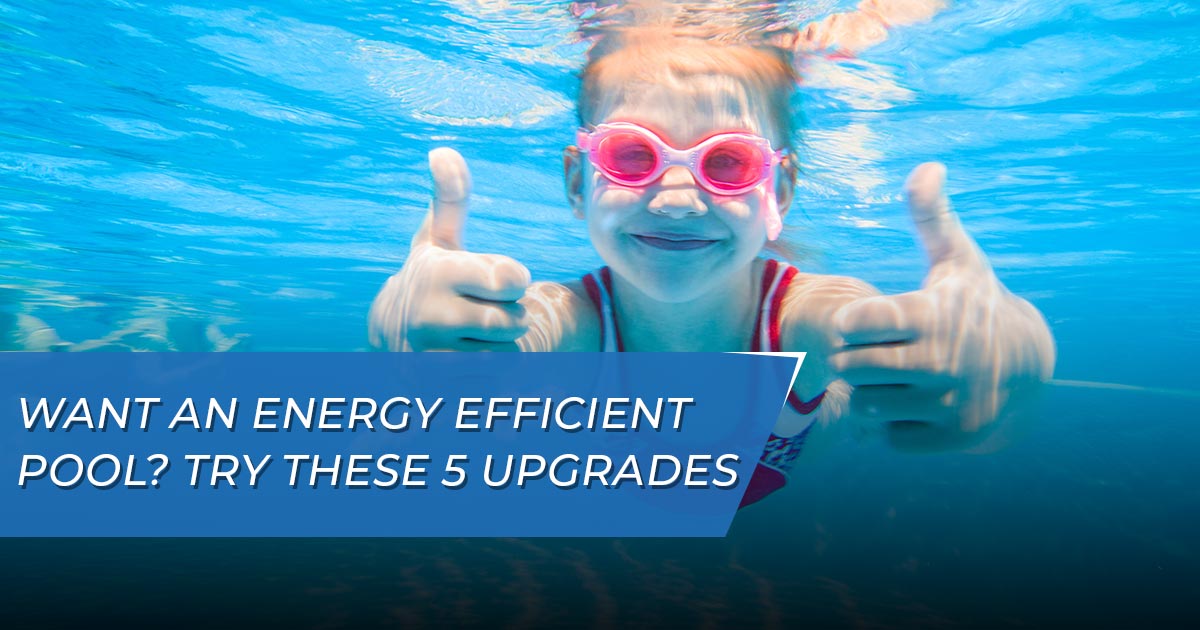Want an Energy Efficient Pool? Try These 5 Upgrades
Your pool area is your oasis, but it doesn’t need to be expensive. Every year, pool owners upgrade their backyard recreational area to be more energy efficient—installing highly optimized pumps, filtration systems, heaters, covers and sanitation systems.
The energy efficient pool has become so popular, in fact, that they’ve pulled ahead in the commercial world, too. As “clean and green” energy lifestyles become increasingly popular, support from code committees, state legislators and utility providers has met the challenge with support.
So, what does your pool area say about you? Even if your pool was installed a decade ago, you can still save a lot of pool energy costs with a few nifty upgrades. Or, if you’re already planning on remodeling your pool and deck-side—why not outfit the spot with some cost-efficient solutions?
5 of The Best Energy Efficient Pool Upgrades
The Variable Speed Pump
 Variable speed pumps might be a little more expensive than single speed pumps due to their added electronics, but their incredible energy efficiency will save you more money, in the long run. On average, these pumps save about 90 percent more on pool energy costs than traditional pumps. As seasons change, the cost-saving opportunities are massive.
Variable speed pumps might be a little more expensive than single speed pumps due to their added electronics, but their incredible energy efficiency will save you more money, in the long run. On average, these pumps save about 90 percent more on pool energy costs than traditional pumps. As seasons change, the cost-saving opportunities are massive.
Your pool’s pump is essential for maintaining clean, crystal-clear waters. More or less, it’s your pool’s circulation system—extracting debris while mixing chemicals. Before the variable speed pump existed, pool-owners only had single and dual-speed pumps. When turned on, these pumps stayed on—maintaining specific speeds with static filtration rates. These pumps are turned off manually, ending their filtration cycle.
Variable speed technology is certainly innovative. Adhering to strict energy efficiency guidelines established by the U.S. Environmental Protection Agency, as well as the U.S. Department of Energy, the best variable speed pumps are ENERGY STAR® certified. Currently, the United States Department of Energy has a bill that will require the installation of variable speed pumps alongside all new pool installations in 2021. The bill will also require the installation of variable speed pumps during pool repairs, effective in the same year onward.
Variable speed pumps utilize highly efficient magnet motors designed to reduce vibration and noise. Of course, your pool will determine your variable speed pump’s performance level—assuring the water is perfectly filtered for efficient chemical circulation.
Unlike traditional, single speed pumps, variable speed pumps offer around three to eight adjustable speeds—running on built-in timers to assure supreme speed and duration optimization.
Helpful information: Pentair Variable Speed Pool Pump Review | Hayward Variable Speed Pump Review
Solar Water Heating
In the past, solar water heaters were highly exclusive—only found in massive backyards owned by the rich and famous. Today, they’re much less expensive. Depending on where you live, a solar water heating system is a fantastic investment—allowing you to pay less for warm water.
Solar-powered pool heaters absorb sunlight to pump your pool’s water through the filtering cycle. As it’s filtered, the water passes over several solar collectors—becoming warmer. These cool heating systems are eco-friendly, affordable and just as effective as other pool pumps. They’re more durable than heat and gas pumps, too, so you’ll spend less on maintenance costs.
Because these panels are solar powered, Florida is an excellent location for installation. With plenty of sun to go around, you’ll benefit from a virtually endless supply of heating energy. A great benefit of these heaters is that they introduce warm water after it’s passed through your pool’s filter—free of debris and contaminants
Meanwhile, the system’s automatic or manual flow control valve—depending on the system—diverts your pool’s water into a solar collector to be warmed. Understandably, a solar water heating system has a lot of equipment powering it. If you’re interested in getting your own system, just make sure you have some extra space available for installation.
The Electric Heat Pump
Sometimes, the most energy efficient pool uses simple technology. Electric heat pumps aren’t new, but they’ve come a long way since they were first made. As an alternative to solar, propane and gas powered heat pumps, electric heat pumps shine due to their innovative technology—which transfers ambient air heat into your pool’s water.
Within the electric heat pump is an assortment of high-tech coils—each filled with refrigerant. When the air’s heat is pulled into the system, the refrigerant transforms it into a gas—sending it through the system’s compressor. Once fueled, this compressor powers a condenser which heats up your pool.
Electric heat pumps aren’t affected by extreme temperatures, so their operational capacity is always reliable. However, due to an electric heat pump’s use of ambient air to heat a pool, most electric heat pumps won’t function in air temperatures below 54 degrees.
They’re versatile, too, as most modern electric heat pumps can also cool a pool down. During sunny Florida days, an electric heat pump can save as much as 85 percent on pool energy costs.
Helpful Information: How to Choose the Right Electric Swimming Pool Heater
The Robotic Pool Cleaner
Robotic pool cleaners are another way to save on pool energy costs, sparing your system from operational overtime. They’ve become commonplace in many backyards, and they’ve come a long way in terms of technological ability. Not only do they not run as long as your pool’s cleaning system, but they assure maximum cleaning efficiency at a fraction of the energy usage.
On average, robotic pool cleaners cost about five cents, per hour, to use. This great operational cost reduction exists because robotic pools cleaners don’t need to use your pool’s filtration system. So, you can run your system for fewer hours without sacrificing your pool’s cleanliness.
Some robotic pool cleaners can clean your pool’s steps, walls, coves and other tough-to-reach areas, too. Modern versions of these cleaners utilize electric motors to move and create suction. Plugged into a regular outdoor outlet, this nifty tech addition functionally serves as a highly efficient vacuum.
The Automated Pool System
Why not just automate of your pool’s processes? A little convenience can save plenty of money—especially when you’re saving time with smartphone-controlled functions. Rather than flip every pool system switch individually, you can establish digital schedules on an app control panel.
An automated pool system can take care of chemical adjustments for you, pre-programmed to identify and maintain your pool’s optimum sanitation levels. You can even hook up multiple systems, controlling your pool and spa via intuitive controls for salt water systems, pool heating systems, LED pool lights and landscape lighting.
Helpful information: The Benefits of Swimming Pool Automation
Creating Your Energy Efficient Pool and Reducing Costs
GPS Pools has an expansive inventory of pool tech upgrades, and we’re here to help you save money, year-round. Ask our team about today’s leading upgrade options, and outfit your pool with cutting-edge technology. As your top-rated pool remodeling, maintenance and service provider, GPS Pools is dedicated to our community.
To learn more about making your pool energy efficient, check out our featured blogs. Or, browse our high-tech inventory of energy efficient additions to redefine your swimming experience.

